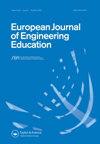How does studying abroad affect engineering students' intercultural competence: A longitudinal case study
IF 2.8
Q2 EDUCATION & EDUCATIONAL RESEARCH
引用次数: 0
Abstract
ABSTRACT We investigated the development of intercultural competence (IC) among engineering students participating in an international study program (GoLaSalle). IC was measured using the Multicultural Personality Questionnaire (MPQ) by Van der Zee and Van Oudenhoven (2001), and the Expanded Cultural Intelligence Scale (E-CQS) by Van Dyne et al. (2012). Data were collected from 293 French engineering students before and after participating in the semester abroad. In line with previous studies, we found that study abroad plays a central role in the acquisition and development of IC. However, such IC development differs across dimensions and gender. While almost all women’s IC dimensions gained from studying abroad, men’s IC showed less malleability. Our results demonstrate the value of integrating a study abroad semester into the curriculum of engineering students. We discuss ways in which students’ IC could be further improved.留学对工科学生跨文化能力的影响——纵向案例研究
摘要:我们调查了参加国际学习项目(GoLaSalle)的工科学生的跨文化能力(IC)的发展。IC采用Van der Zee和Van Oudenhoven(2001)的多元文化人格问卷(MPQ)和Van Dyne等人(2012)的扩展文化智力量表(E-CQS)进行测量。数据收集了293名法国工程专业学生在参加海外学期前后的数据。与之前的研究一致,我们发现海外留学在集成电路的获取和发展中起着核心作用。然而,这种集成电路的发展在不同维度和性别之间存在差异。几乎所有女性的智商都是在留学期间获得的,而男性的智商则表现出较低的可塑性。我们的研究结果证明了将出国留学学期纳入工程专业学生课程的价值。我们讨论了如何进一步提高学生的智能。
本文章由计算机程序翻译,如有差异,请以英文原文为准。
求助全文
约1分钟内获得全文
求助全文
来源期刊

European Journal of Engineering Education
EDUCATION & EDUCATIONAL RESEARCH-
CiteScore
7.30
自引率
13.00%
发文量
64
期刊介绍:
European Journal of Engineering Education is published six times a year in print and electronic editions and provides an essential forum for dialogue between researchers and specialists in the field of engineering education, at European and worldwide levels. European Journal of Engineering Education is the Official Journal of SEFI, the Socièté Européenne pour la Formation des Ingénieurs (the European Society for Engineering Education). SEFI is a non-governmental organization whose aims are to develop information about engineering education, to improve communication and exchange between professors, researchers and students and to promote cooperation between the various institutions concerned with engineering education.
 求助内容:
求助内容: 应助结果提醒方式:
应助结果提醒方式:


